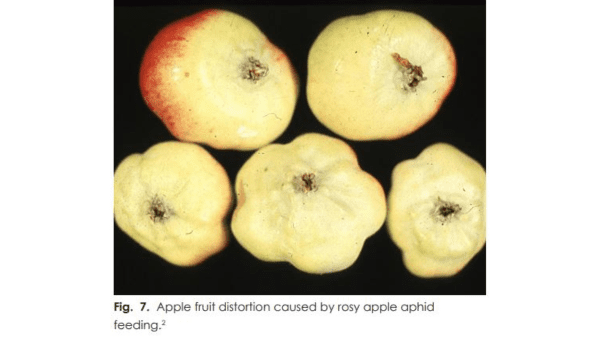Biological controls for aphids in apples have been contemplated (and used) for decades.
Enemies of the pest include species of parasitic wasps, Lysiphlebus testaceipes (Cresson) and Proon species, as well as Ephedrus cerasicola and Aphidius matricariae. (I am thinking of a Jeopardy-like show in which contestants attempt to pronounce these names.)

But the wasps’ efficacy has been limited. They “attack apple aphid primarily early in the season, but neither species completes its development on apple aphid, so their potential usefulness in an IPM program may be limited,” according to Washington State University Extension. Apple Aphid and Spirea Aphid | WSU Tree Fruit | Washington State University
Researchers at Belgium’s Catholic University of Louvain may have found a way to enhance the wasps’ firepower. Wasp larvae that eat aphids alive may save apple crops | The Economist
The studies have focused on the rosy apple aphid (which, admittedly, rarely causes economic damage in American apple crops). https://extension.usu.edu/pests/uppdl/files/factsheet/aphids-apple.pdf
The wasps do not kill and eat the aphids; their larvae do. Adult wasps lay their eggs in the aphids. Once the larvae hatch, they feast on the aphids’ internal organs. (Who said that Mother Nature was kind?)
The use of the wasps to control apple aphids has been of limited value so far. But the Belgian researchers think they know why.
Up to now, efforts have focused on the larvae (which, after all, do the dirty work) while neglecting the adults, which feed not on aphids but on nectar.
The researchers proposed to change that by planting banks of flowers next to the trees.
They discovered that their test plots with flower banks did have aphid populations that were a third less than the control.
This is not exactly a thrilling result, but it does show some promise, which might be enhanced by further understanding of the wasps’ life cycle.
It is another potential weapon for insect control for growers who have organic or regenerative programs.



